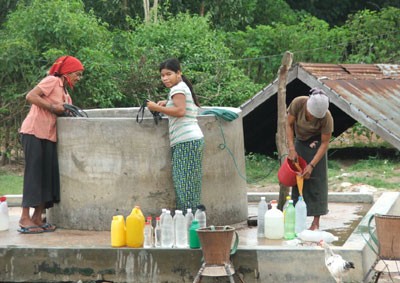(VOVworld) – Human rights means humans are given favorable conditions by society to develop materially and spiritually. Vietnam’s human rights achievements, particularly in poverty reduction, have been acknowledged internationally.
The United Nations and Vietnam share the same viewpoint that fundamental human rights include: the right to life, the right to freedom and personal security, the right to equality before the law and protection under the law, and the right to freedom of travel. These rights can only be exercised when people’s essential needs are met. Vietnam’s poverty reduction has ensured its citizens’ essential needs and fundamental human rights.
Poverty reduction, an important element of social policy
One of Vietnam’s economic development targets is to reduce poverty and improve people’s living standard. Vietnam accelerated poverty reduction in the early 1990s as part of its renewal program. In the early 21st century, the state incorporated poverty reduction in its sustainable development strategy. Poverty reduction programs were prioritized in mountain, remote, border, and island areas. Key programs were the national target program for poverty reduction from 2006 to 2010 and a socio-economic development program for especially disadvantaged communes in mountain and ethnic areas known as Program 135. Program 135 helped 2,000 poor communes build needed public facilities, restructure agricultural production to meet market demand and narrow the development gap between regions. Vietnam’s current poverty reduction programs focused on helping poor people increase their income, attitude, and access to social services. Poor people have been benefiting from preferential policies on credit, agricultural production, infrastructure, education, and healthcare.
 |
Impressive poverty reduction results
In 1993 Vietnam was one of the poorest countries in the world with an annual per capita income of 100 USD and low social development indexes. 20 years later, Vietnam has become a middle-income country with a GDP of 154 billion USD and an annual per capita income of approximately 1,700 USD. Approximately 30 million people escaped poverty between 1993 and 2013, reducing the poverty rate from 58% to just 7.6%. Vietnam’s poverty reduction policy targets not just higher incomes for poor people but also greater access to social services such as healthcare, education, and social inclusion. The state has expanded the list of recipients of regular social allowances to 2.5 million people and increased support for ethnic minority people. The United Nations has ranked Vietnam 6th globally for achieving 5 of its 8 millennium development goals. Vietnam expects to achieve the remaining targets by 2015. Vietnam is also one of the 38 nations honored by the UN Food and Agriculture Organization for poverty reduction achievements.
Poverty reduction results prove effective state performance
World history indicates that any nation that cares about people’s lives manages to maintain stability and the conditions to grow. The exercise of human rights depends largely on poverty reduction results and people’s living standards. With its achievements in poverty reduction, Vietnam is proud to be a member of the UN Human Rights Council and is ready to join any UN periodic review mechanism to share its experience.